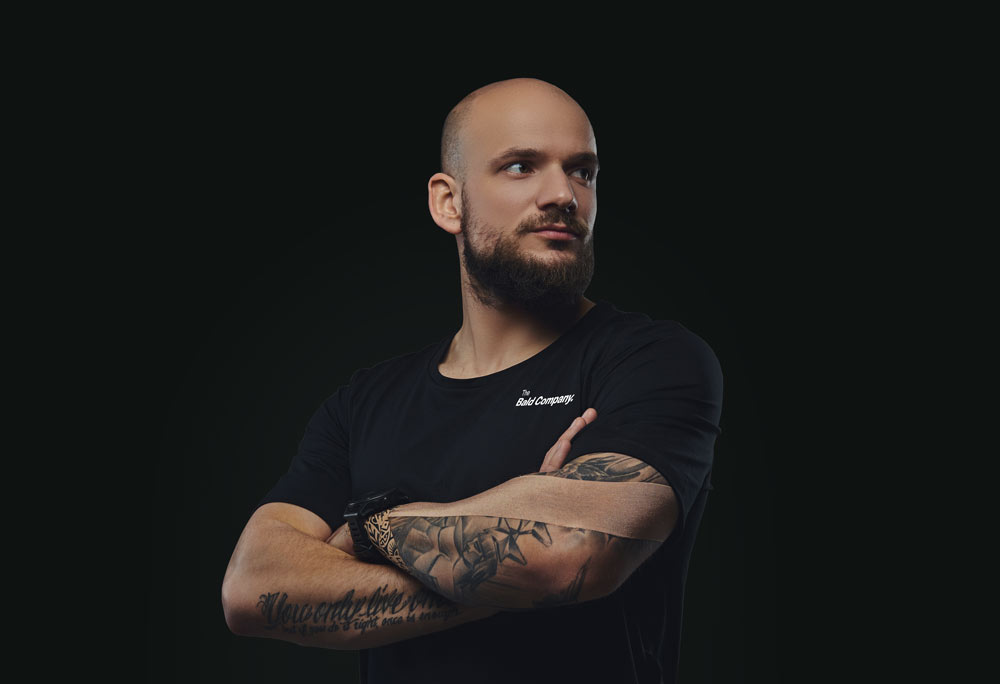Chapter 3
The Side Effects of Denial

Welcome to Episode 3 of Losing To Win where we look at the initial phase that all newly balding people go through: denial. We’re also going to investigate all the weird and wonderful ways the world will try to profit off you when you’re at your most vulnerable, and arm you with the weapons to fight back.
Denial. We’ve all been there. And if you think you haven’t you’re probably in deeper than you realise. But we’re not here to point fingers, shame or label people – being in denial about hair loss is so common and widespread it is now a multi-billion dollar industry.
What we’re here to unpick and unpack is, why?
If you haven’t read our blog piece called The Fork, it’s a useful introduction into the psychology of denial and its repercussions. But here are the highlights:
- You’re preconditioned to fear going bald.
- The anti-bald industry preys on your vulnerability.
- False hope is the most expensive item you can buy.
The language of false hope is designed to minimise the risk and maximise the benefit. Of course, there are rules and regulations that limit the anti-bald industry’s ability to lie or make false claims – but when you’re raking in mega-bucks from the vulnerable, you can afford to pay top-notch wordsmiths to create legal sounding loopholes using words and phrases like:
For the, can, could, may, might, has been proven to be effective in, slow, slows or slowing, minimal, in some cases, uncommon and so on and so on and so on.
Another tactic is to ask if you want thicker, fuller looking hair – and then talk about the product without ever referring to it having an ability to deliver such a thing.
And if you think the household name hair hat companies are immune from this kind of behaviour, think again.
One ‘international’ clinic claims that “This procedure and therapies guarantee an amazing result*.”
Sounds great right? But that little star on the end , called an asterix, is a big red flag.
For anyone not fluent in ‘terms and conditions apply’ an asterix at the end of sentence means that whatever preceded it isn’t entirely true – or could be misconstrued to be true. It’s the equivalent of a ‘yeah, but’. Like “I have a girlfriend.” “Really?” Yeah but she goes to another school you wouldn’t know her.”. That kind of thing.
In this case, the asterix at the end of “This procedure and therapies guarantee an amazing result.” Lead us this ‘yeah but’: Results may vary depending on individuals.
And this is before we even interrogate what ‘an amazing result’ actually means. Who is this amazing result guaranteed for? The customer or the business?
Fact is, if it looks like a duck but smells like bullshit, it’s more than likely bullshit.
Of course, this is easy to see when it’s pointed out, but when you’re desperate, vulnerable and leaking hair, you’re not looking for faults, you’re looking for promise, hope and deliverance.
This is the number 1 side effect of denial: impaired judgement.
Let’s preview number 2 by asking some bald men on the street.
Question: Would you sacrifice the ability to sustain an erection for one more year with a full head of hair?
That’s right, the number 2 side effect of denial is actual, real life, side effects.
Putting your faith in pills, potions, chemicals, implants and transplants comes at a significant financial cost. But it also comes at cost.
We don’t want to be alarmist, but the actual, legally required to list, side effects of certain anti-bald treatments include: reduced libido, temporary to permanent sexual dysfunction in men, ‘breast changes’ and unwanted hair growth in women, bleeding, ‘unsatisfactory cosmetic outcomes’, scarring, burning of the skin, dandruff, temporary hair loss, hair loss on the scalp, infection, oily skin to name a few.
And that doesn’t include the pre-warnings related to pregnant and breastfeeding women, requiring a prescription from your doctor, and that if you stop using certain products any benefit derived from using them will cease and reverse.
But hey, some of them could also prevent acne.
So, there’s that.
The 3rd side effect of denial is undoubtedly the most serious:
Loss of life.
Not death. Loss of life. There is a difference.
Choose denial and you commit yourself to hiding your baldness for the rest of your life.
Every day, every week, month and year for as long as you live, you’ll be spending time, energy and headspace keeping up the illusion that you still have hair.
All that effort covering up something you’ve been made to believe you should be ashamed of – instead of embracing it, working with it and confidently moving on to actually live your life to the fullest.
So if you’re contemplating denial as your way forward, think about how it fits into your lifestyle in one year, five years, ten years and 20 years down the track. Do you still want to be massaging goop into your scalp or swallowing pills on your 4823rd day of being unable to have sex? Or getting a top up on your implants because you’re even balder now than you were when you originally got them plugged in?
Once you realise that you don’t have to be ashamed of going bald, nothing about denying your impending baldness makes sense.
We’ve said it before and we’ll say it again, no one dreams of going bald – but it’s not a nightmare either. It’s just a different haircut for a different stage of life.
Work with it. Live with it. And you’ll learn to love it too.

